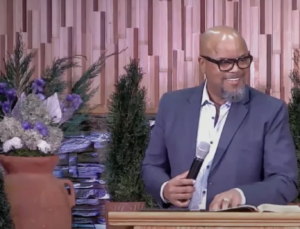Troubled Calvary Chapel Cary Sells for $7 Million
Sale Preceded by Drug Scandal, Money Issues

Pastor Rodney Finch’s Calvary Chapel Cary has sold its 9.8-acre church property in Apex, North Carolina — and this time, it’s for real.

Rodney Finch, preaching at Calvary Chapel Cary in May 2023 / Video screenshot
Finch, whose rocky tenure at Calvary Chapel Cary tested the limits of the Calvary Chapel Association’s (CCA) ability to rein in misbehaving pastors, had previously put the church up for sale in secret. After his board and congregation found out in July 2024, Finch withdrew the listing, but the damage was done. He announced his resignation in August, then rescinded his resignation less than two months later due to a dispute over retirement pay. He removed the pastors who were slated to replace him and set up a new church board.
As MinistryWatch reported, the church then closed its doors late last year and began liquidating assets through estate sales. Now, the entire three-lot property, which includes two buildings totaling about 40,000 square feet, has been sold for $7 million.
According to a deed filed with Wake County, the church was purchased on February 21 by a local LLC called LIWSP Apex, whose articles of organization indicate it was formed just two days prior. In a letter of no objection by the state assistant attorney general’s office, the buyer is identified as Longleaf Industrial, LLC, a real estate development company owned by former NHL hockey player Tim Brent.
Calvary Chapel Cary board member Steve Youell, a real estate agent in Florida, confirmed to MinistryWatch that the church sold for $7 million, but said he did not know the buyer’s plan for the property.
Youell said all the church’s debts have been paid, but the negotiation of Finch’s retirement remains an outstanding issue as they decide what to do with the profits from the sale. He also explained that the leadership has been working closely with the North Carolina attorney general’s office to ensure all laws are followed, and that they are following its recommendation to consult a certified public accountant.
“All the guys on the board are smart businessmen, and there won’t be any appearance of impropriety,” Youell said.
Nazneen Ahmed, communications director for the assistant attorney general, offered more details.
“According to Calvary, the proceeds are to be applied exclusively for the purposes of the mission of the Calvary Chapel as described in its bylaws, and among other things, Calvary plans to expand their outreach ministries and locate and lease/purchase a new meeting location,” she said.
Finch announced last summer that he wanted to sell the church because he believed his retirement, which he had allegedly already been planning, would reduce the congregation size and make it difficult to pay the mortgage. At the time, the idea was to move to a more affordable location. However, that was before the church canceled services, held multiple estate sales and scrubbed its online presence.
If Calvary Chapel Cary chooses to dissolve, as a tax-exempt organization it faces strict federal standards on asset distribution. IRS Code 501(c)(3) requires that its remaining assets be allocated exclusively to another charitable entity or a federal, state, or local government for a public purpose. The organization cannot give any of these assets to individuals, including board members, employees, or volunteers, although it may in some cases pay outstanding salaries or debts to individuals before closure. In addition, North Carolina’s Secretary of State mandates a dissolution plan outlining how a nonprofit’s funds will be distributed.
Calvary Chapel Cary’s articles of incorporation, filed in 1997, state that after paying all liabilities, the board of directors will give all remaining assets to organizations “operated exclusively for religious, charitable, educational, scientific or literary purposes,” or to government entities to be used for “public purposes.”
Prior to Calvary Chapel Cary’s closing, the church had suffered a string of scandals that caused a significant exodus of worshipers and leaders. In 2019, Finch’s years’ long drug addiction, secretive practices, unchecked power and alleged mishandling of church funds led former staff to submit 50 pages of signed statements to the CCA’s leadership council, which lacked authority to discipline him. Finch retained his pulpit but lost much of his congregation, including a pastor, Scott Burrell, who recently started a new church, Cornerstone Community Church of Apex, at a nearby country club.
TO OUR READERS: Do you have a story idea, or do you want to give us feedback about this or any other story? Please email us: [email protected]
Access to MinistryWatch content is free. However, we hope you will support our work with your prayers and financial gifts. To make a donation, click here.



